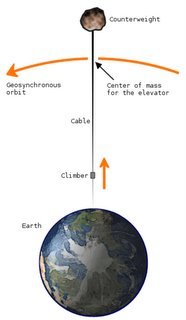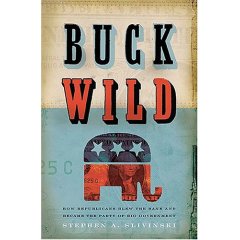In the same post, Instapundit also links to this article by the BBC discussing how technology is empowering grassroots media:What role will startups play in the future?
I see tremendous economic growth from startups from 10 years ago. Entrepreneurs will go from the 1,000 startup ventures funded in the last 10 to 20 years to ideas coming from people working together in network-based environments, using computers to dream up innovations in a way they never did before. It could be people in developing countries with low-cost computers.
You talk about education and the bottom-up effect that millions more people will play in societal advances. How do you see this unfolding?
We will undergo another revolution when we give 100 million kids a smart cell phone or a low-cost laptop, and bootstrap the way they learn outside of school. We think of games as a way to kill time, but in the future I think it will be a major vehicle for learning.
Creative expression (is another area). No longer will just a few write or create music. We will see 100 million people creating the content and art shared among them. Easy-to-use programs allow kids to compose everything form ringtones to full-fledged operas. It will change the meaning of creative art in our society.
We are already seeing early signs of it in blogs. The source of creative content is coming from the world. That revolution will go well outside of the written word to all forms of visual and performing arts.
It is not an impact on the epic scale of an asteroid smashing into the Earth and killing off the dinosaurs, but the collision of technology and media is having profound effects on a more modern ecosystem.My Take: I completely agree with these articles about the trends that technology is allowing to happen. I believe that the innovation and entrepreneurship that has developed these technologies is acting in the marketplace to further lower the costs of innovation and starting up a business. As the pace of technological change quickens, more arbitrage opportunities open up, attracting new entrepreneurs to move into untapped niches in the marketplace. This in turn drives further innovation which continues the trend.
Media are becoming democratised, and a global conversation is emerging.
The tools of production - used to create digital content such as blogs, podcasts, wikis, discussions, multiplayer games, mashups (I'll describe each of those in more detail below) - are increasingly powerful and easy to use, yet decreasingly expensive.
Distribution is also becoming less expensive and easily arranged. . . . The democratisation of media is also, fundamentally, about the people we once called mere consumers. Their role is evolving from a passive one to something much more interactive, but they are blessed (or cursed, depending on one's viewpoint) with an unprecedented variety of voices and services.
Take the media for example: One point I would refine in the BBC article is that I would call it the dispersion of media power rather than the democratization of it. There is still plenty of media power concentrated in the traditional "Mainstream Media" (MSM). What has fundamentally changed is that the tremendous advances in communications and computing technology have allowed any individual with a computer and internet connection to become their own publisher. The MSM maintains an advantage in their brand recognition and breadth of reach through an established media infrastructure (television, radio, newspapers, etc.).
The rise of new forms of media are allowing individuals to publish thoughts onto blogs in real-time, often beating the MSM to stories and acting as a fact-check against the MSM, giving the MSM stronger incentives to report accurately or else loose brand recognition and market share. (Think about the New York Times incident with Jayson Blair or the CBS "Rathergate" fiasco. The blogosphere was also instrumental in John Thune beating Tom Daschle in the last Senate elections -- with Daschle being the only incumbent senator to loose in that election.) The blogosphere is certainly acting as a powerful check against the MSM and a way to get access to stories that do not get press attention in traditional media outlets.
The other neat thing about the blogosphere is that it is rapidly innovating and should continue to do so, barring any political interference in its development. The dispersion of individuals involved makes it much more organic in its development and reduces the power and influence of any one stake-holder. Game theory predicts that this makes collusion extremely difficult (if not impossible), making an excellent "breeding ground" for open communication, exchange of ideas, and rapid innovation. The low cost of ownership and low stake-holder influence work together to create a dynamic environment in which risk-taking, experimentation, discovery and innovation all occur at an increasingly rapid pace.
What is true of the blogosphere should also hold true for any market sector in which there is a dispersion of stake-holders and a lowering of barriers to entry. As more people are able to enter a particular market (be it media, computer programming, biotech, nanotechnology, etc.), competition will increase and innovation will ensue as people strive towards attracting larger shares of the market. (See Michio Kaku's excellent book, "Visions", for more about these emerging technologies.) This should lead to growth of these markets, increased quality of goods and lower prices. What has been interesting about the blogosphere is that it represents a network of individuals that benefit from one another's success. In contrast to normal industries, blogs often increase their influence by cooperating with one another, rather than competing against each other. Blogs tend to compete in trying to win the "battle of ideas" rather than by trying to "win" readership at the expense of other blogs.
We have recently been discussing the book "Guns, Germs, and Steel" by Jared Diamond in my macroeconomics class. In his book, Diamond argues that the primary driving force of historical economic growth has been the geography of where people have lived. A large component of this is the isolation or connectedness people have had with one another. As you might expect, regions (such as the fertile crescent) that have had access to large numbers of trading partners tended to have societies that flourished, innovated and grew. Societies that were cut-off from other regions by geography tended to stay in a relatively primitive form of development.
If you think of this as people being in a "network of exchange", those societies that were able to exchange goods and ideas were able to use these new resources to develop and innovate further. As the pace of exchange quickened, so did the corresponding development. I believe this is the transition we are now seeing occur in the hi-tech fields. The rise of the World Wide Web and ubiquity of computers and internet access has facilitated the development of a world-wide "network of exchange" of ideas. As more and more members enter into this network, the power of this network will grow exponentially.
Innovations that I believe will catalyze this further include developments that make using these technologies even easier and that make access more ubiquitous. Think in terms of how much advances in GUIs (Graphical User Interfaces) for computer operating systems, WYSIWYG (What You See Is What You Get) and text-based editors for blogs (allowing people to create and maintain them without needing any knowledge of HTML), the World Wide Web for the internet, etc. Each one of these advances greatly reduced the learning curve needed to operate these technologies. This has the same effect as reducing the barrier of entry into these areas, opening the floodgates of potential entrepreneurs. As these technologies extend into further areas of the world that now are not well-connected into this "digital geography", we can expect to have greater innovation as a result of the power of their minds and creativity joining in the chorus of innovation.
Will that be an exciting time or what?
For further reading:
Hugh Hewitt's "Blog", Glenn Reynold's "Army of Davids", Jared Diamonds "Guns, Germs, and Steel", and Michio Kaku's "Visions".




Also, be sure to read Arnold Kling's thoughts on how these lowering costs of starting business and rising costs of college should lead more young people towards becoming entrepreneurs.
Questions: What do you think about all of this? Do you think that lowered barriers of entry will lead to increased innovation? Do you expect the spread of the "networks of exchange" I described to new areas of the world to have a large or small impact on those areas? How about on the development of these technologies? What impact do you think the emergence of low-cost bio-tech and nanotechnology will have on the world? Are there any dangers from this? What are the downsides of the development of these technologies? What about the upsides? Do you have any other thoughts on these issues?
















